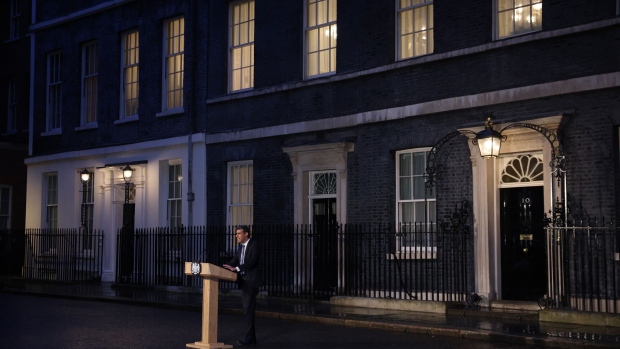Apr 28, 2024
Sunak Braces for Key Test With Tory Opponents Ready to Strike
, Bloomberg News

(Bloomberg) -- Rishi Sunak has spent 18 months as prime minister fending off internal Conservative Party criticism and rumors of plots to oust him. So far it’s come to nothing — though his team is taking nothing for granted this week.
His critics on the Tory right have spent months gearing up for Thursday’s local and mayoral elections across England as their final chance to oust Sunak. If the party suffers a bad result — it trails Keir Starmer’s Labour by about 20 points in polls — they will use it to try to persuade colleagues that only a change of leader can prevent a wipe out in the UK-wide vote expected in the autumn.
It’s a threat Sunak’s senior ministers are taking seriously. Defense Secretary Grant Shapps told the Times newspaper on Saturday Tory MPs should let the prime minster “get on with the job,” while Sunak himself told Sky News on Sunday that “local elections are always difficult for incumbent parties.” Speaking to the Sunday Express, the premier again promised tax cuts if voters give him another term.
To be sure, the prevailing view in Westminster is that Sunak will lead the Conservatives into the general election, in part because there are no obvious unifying candidates and because most Tories fear their support will erode even further if they appoint another leader without giving voters a say. Sunak is the third prime minister since the 2019 election, after Boris Johnson and Liz Truss.
Read More: ‘Operation Save Rishi’ Aims to Get Leader Through Key Vote
But Conservative Party rules mean Sunak can’t take that for granted. The rebels only need just over 50 letters from Tory MPs to trigger a no-confidence vote in the party leader. Those plotting to oust him have said they are stepping up their whipping operation ahead of the local elections, though given the numbers required, it’s also possible for the threshold to be hit without such coordination.
The risk for Sunak is if the Tories perform so badly that the wider party loses any remaining hope of staying in power after the general election.
Critics have loosely defined that as losing about half the local council seats the Tories are defending, but more importantly, if they fail to hold onto two mayors — Andy Street in the West Midlands and Ben Houchen in Tees Valley in northern England — who represent the party’s ability to compete in Labour-facing areas.
Though polling for local and mayoral elections is less intensive than for national votes, surveys show both mayoralties in play with days to go.
Houchen has held the post since 2017 and won with 73% of the vote the last time Tees Valley was contested in 2021, which explains why losing it would be such a bombshell for the Tories. Street’s challenge was expected after Sunak canceled a high-speed railway link from Birmingham to Manchester last year.
Ahead of the elections, the government has noticeably ramped up the pace of announcements including promising to boost defense spending. Sunak is also talking up his flagship policy to deport asylum-seekers to Rwanda, and the Guardian newspaper reported Sunday that the Home Office will begin detaining migrants sooner than expected this week to prepare for the flights.
Allies of the prime minister described last week as his best in office and that Sunak had entered campaign mode ahead of the general election. There has been intense speculation that he may even announce a date on Monday — though his office has tried to play that down. Speaking on Sky News, he refused to confirm when the vote would be held.
Home Office minister Chris Philp told the BBC the general election will be “most likely in the autumn” and predicted Tory support would rise beforehand.
“People do feel grumpy with the government,” he said. “But as we get closer to an election, it’s not so much a referendum on grumpiness. It becomes actually a choice — who do you want to run the country?”
But Sunak’s problem is his failure to put a dent in Labour’s poll lead, while his own approval ratings are at a record low. Criticism of him from the Tory right — even on policies like Rwanda deportations that they support — isn’t going away.
“A few symbolic flights is not a deterrent,” Robert Jenrick, a prominent Tory rebel who resigned as immigration minister last year, told GB News on Sunday.
Sunak’s other major problem is that since becoming premier, he’s struggled to maintain a positive news cycle for any length of time. What his aides called a good week came to an abrupt end over the weekend when Dan Poulter, the MP for Central Suffolk and North Ipswich since 2010 who also works in the National Health Service, announced he was quitting the Tories to join Labour.
Poulter, who is due to appear with Starmer on Monday, said being a Tory MP meant he found it “increasingly difficult to look my NHS colleagues in the eye.”
©2024 Bloomberg L.P.








